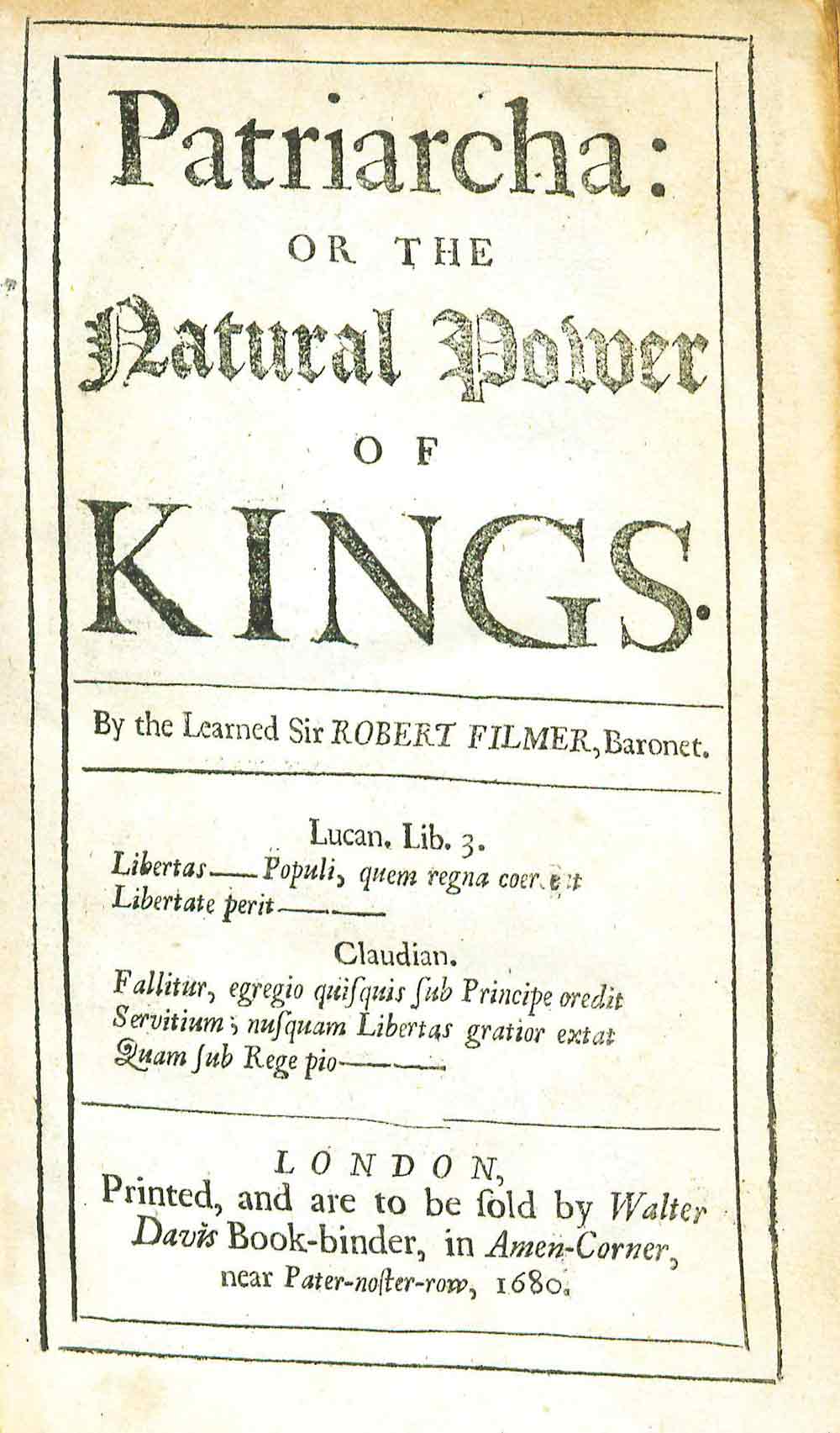Patriarcha, Or, The Natural Power of Kings
by Sir Robert Filmer
| Patriarcha, Or, The Natural Power of Kings | |
|
Title page from Patriarcha, Or, The Natural Power of Kings, George Wythe Collection, Wolf Law Library, College of William & Mary. | |
| Author | Sir Robert Filmer |
| Published | London: Printed, and are to be sold by Walter Davis Book-binder |
| Date | 1680 |
| Edition | First |
| Language | English |
| Pages | 7 p. l., 141 |
| Desc. | (19 cm.) |
Sir Robert Filmer (c. 1588-1653), an English political theorist and defender of the divine rights of kings, was born almost certainly in 1588 in Kent’s East Sutton parish.[1] He matriculated from Trinity College in Cambridge in 1604, though he did not take a degree. He was later accepted to Lincoln’s Inn, one of the four Inns of Court in London to which barristers of England and Wales belong when they are “called to the Bar,” an English term indicating that a one is qualified to argue in court on behalf of another.[2] Filmer was called to the bar in 1613. Despite his qualifications, there is no evidence that Filmer ever practiced law.
Patriarcha, Filmer’s best-known work, was written in about 1630 and remained unpublished for nearly 50 years.[3] Much dispute has arisen over Patriarcha’s original date of composition, but “good internal evidence” at the University of Chicago Code MS 413 strongly suggests composition before 1631.[4] Patriarcha represents an attack on the Calvinists and the Jesuits, two enemies of royal power in Filmer’s view.[5] In it, Filmer espouses the doctrines of extreme believers of the Divine Right party, theorizing that the family as a model for the state represents the true origin and appropriate model of all government and that subjects have a duty of passive obedience.[6] Filmer’s argument in Patriarcha traces the divine nature of the rule of patriarchs from the Old Testament onward, asserting that modern kings draw their power from the authority given by God to Adam, to Noah, to Noah’s three sons, Shem, Ham, and Japheth, who ruled the three continents of the Biblical Old World.
After his death, Filmer’s writings gained notoriety as a target for criticism in John Locke’s first Treatise and became a object of ridicule for Locke’s Whig contemporaries, including James Tyrell and Algernon Sidney.[7]
Evidence for Inclusion in Wythe's Library
Description of the Wolf Law Library's copy
View this book in William & Mary's online catalog.
References
- ↑ Glenn Burgess, [http://www.oxforddnb.com.proxy.wm.edu/view/article/9424 "Filmer, Sir Robert (1588?–1653)" in Oxford Dictionary of National Biography (Oxford University Press, 2004- ), accessed 3 Oct 2013. (Subscription required for access.)
- ↑ The Bar Council website, s.v. "Being Called to the Bar," accessed October 3, 2013 http://www.barcouncil.org.uk/becoming-a-barrister/how-to-become-a-barrister/being-called-to-the-bar.
- ↑ Glenn Burgess, "Filmer, Sir Robert."
- ↑ Ibid.
- ↑ The Oxford Companion to Philosophy, ed. R.S. Downie and Ted Honderich (Oxford: Oxford University Press, 1995), 280.
- ↑ Ibid.
- ↑ Glenn Burgess, "Filmer, Sir Robert."
